By Ben Rothenberg
A Year After Her “Hell,” Olga Sharypova Is Ready
to Speak Out.
Having started over with the modern clean slate of a new phone, Olga Sharypova has recently been putting the evidence of her story back together as best she can through scattered images that still linger on the phones of her friends.
As we sit at the kitchen table of the house where she is staying in New Jersey before our interview begins, she shows me one screenshot she recently received from a friend of a WhatsApp conversation they had a year ago. At the top are two photos sent by Olga: The first shows dark bruises on her face; the second shows two dark bruises on her arm.
“Что это?” (“What’s this?”) her friend asked.
“Это Саша” (“This is Sascha”), Olga replied.
****
Though we had traveled fairly parallel paths to many of the same stops on the tennis tour for a year, I had not met Olga Sharypova, known by the diminutive Olya to her friends, before last Friday, two days after she decided she was ready to tell her story: Her ex-boyfriend Alexander “Sascha” Zverev, she said, had become increasingly emotionally and physically abusive over the course of their relationship, which lasted 13 months, wounding her both physically and psychologically.
Zverev, a runner-up last August at the US Open who has been ranked as high as No. 3 in the ATP rankings, issued a blanket denial to Sharypova’s initial account on Thursday, saying that her “unfounded allegations” were “simply not true.” When I contacted Tony Godsick, Zverev’s agent, for this story to respond to the new specific allegations contained below, Bela Anda, a crisis management PR specialist with whom Zverev is working, responded thusly:
“As you know, Alexander put out a statement on Instagram last week and he stands by this statement,” Anda wrote. “Therein Alexander Zverev has commented on the accusations of Mrs. Sharypova, who he has known since childhood and had a relationship with, that ended a long time ago. Mr. Zverev regrets that Mrs. Sharypova continues to feed the public without having spoken to him. We are still working towards achieving the reasonable and respectful dialogue Alexander mentioned in his original statement.”
When I asked the ATP if they were investigating Sharypova’s account of abusive behavior by Zverev, and what their policy was regarding domestic violence, their spokesperson responded only by pointing me toward a section of the ATP rulebook that broadly defines “an obligation for ATP players…to refrain from engaging in conduct contrary to the integrity of the game of tennis,” which could include criminal charges or simply behaving in “a manner severely damaging to the reputation of the sport.”
Sharypova has not pressed charges and told me she does not plan to seek any sort of criminal or civil justice for what she says Zverev did to her, because she doesn’t “want anything from him.” Her lone goal, she says, is to help other people who might be in similar situations find the strength to survive and be as resilient as she has been.
“I just want to say the truth,” Sharypova said.
Over the course of our two-hour interview, she had a lot to say.
****
Sharypova, 23, was herself a dedicated tennis player for a decade, picking up the sport at age 5 as a young girl in Moscow. Her mother had a mutual friend with the tennis coach Marina Marenko, best known to current tennis fans as the mother of ATP player Andrey Rublev.
“I was a very active kid,” Sharypova tells me as she begins her story, drifting between English and her native Russian being translated by a friend who joined us in the living room. “I loved tennis in the beginning.”
Sharypova played many ITF-level junior events, traveling as far as the Dominican Republic for competitions, albeit without achieving the success of many of her peers. After a decade spent training intensely in the sport, she had grown ready for new challenges and experiences.
“At 15 I thought that the world is big, and I want to know another part of it,” she said. “I’d already played tennis; I’d spent all day long on the court, I’d think about tennis all day long. I had no time to learn anything else, but I wanted to.”
Once she stopped tennis, Sharypova started reading novels, poetry, and psychology. She also picked up photography, which remains a passion.
“I like to take pictures of people, and show how I see this world,” she said. “Every human sees this world differently, from their own perspective. That’s why I chose photography, to show mine.”
Eventually, one of her photos pulled her back into the tennis orbit.
****
Sharypova first met Zverev, she said, at a tournament in the United States when they were both around 14 years old.
“The year after, he wanted me to be his girlfriend,” she said. “I was in America for one month; we were talking a lot during that time, and then we started dating. Texting, talking at tournaments, walking around together, stuff like that.”
Once she stopped playing tennis, the relationship between the two teens quietly fizzled out, impossible to sustain with him living in Germany and her still residing in Moscow.
About six years later, they reconnected as young adults after Sharypova posted a photo of herself on Instagram that made Zverev, who was in New York to play the US Open, think that she was also in the city at the same time. It was an old photo she had posted while in Moscow, but it rekindled their relationship anew.
“We started chatting and after he asked me to come to Monaco to see each other,” she said. “We started dating for a second time.”
Sharypova remembers the date their renewed courtship began: Sept. 5, 2018, after Zverev had returned to Monaco following a third-round loss at the US Open four days earlier.
****
Sharypova also remembers that the first time an argument with Zverev turned physical was in Monaco as well, though she could not recall precisely when last year it occurred.
“The first time was in Monaco in his apartment,” she said. “I was going to leave because we had a really big fight. I was standing in the hallway, and he hit my head into the wall.”
Sharypova said that after she hit the wall, she slumped down to the floor.
“He got scared, and then he started lying,” she said of Zverev. “He said I hit him first, he was saying he didn’t do it, he’d never done it. I was just, ‘What? I’m on the floor, what are you talking about?’ Am I out of my mind or what? This was the first situation.”
Sharypova said arguments between the two had first begun during an off-season trip to the Maldives with Zverev’s family and friends in late 2018, just a few months after they had started dating. Though there was no physical element to these initial disputes, Sharypova emphasized that they were “already painful” for her.
“I think it’s important to say that not only physical violence is important; we have emotional violence, too,” she said. “I went through both sides, emotional and physical. All the physical fights were from the emotional violence.
“You know, I can read many messages from people who I don’t know [saying] that I’m a slut, that I’m a bad person, something like this,” Sharypova added. “I can handle it on social media. But I don’t want to hear it from the person I love.
“It was really hard. He was pretty toxic, telling me terrible things, saying ‘You’re nobody,’ saying, ‘You didn’t earn anything in this life. I’m a successful person, I earn money—but you’re nobody.’”
****
Sharypova split her time between traveling with Zverev and being home in Moscow, but said she struggled to break free from him even when far apart.
“Whenever I wanted to break up or quit, I would stop talking to him or put him on my phone’s block list; he would still reach out to me through my friends or family members,” Sharypova recalled. “I’d be in Moscow with my friends, doing nothing, just meeting each other to talk, and then Sascha would start calling me. I’d say ‘Sascha, I’m with my friends, can I spend time with them?’ He’d say, ‘No, you need to talk to me. I’m important. I’m not important to you?’ I’d say, ‘I want to talk with you, but later. Can I call you back in a few hours?’ ‘No. I’m not important to you? You don’t love me? You don’t want to spend time with me?’”
When she would hang up, Sharypova said, Zverev would then start calling her friends and ask them why she wasn’t answering his calls. “All my friends hated him for this,” Sharypova said. “Anytime I’d meet someone and we’re sitting in a café, I’d spend all my time on my phone, because he wanted that. He wanted me to text and call. I didn’t have time for a life. I don’t know how he did this, because he needed to train, to do physical stuff. One of the biggest reasons for our fights was that I wasn’t giving him all the attention he wanted.”
Zverev’s controlling and possessive nature, Sharypova said, took a severe toll on her emotional well-being.
“He would make me feel that it was my fault, to make me feel guilty for having a good time without him,” she said. “So when I was happy without him I felt bad, because I knew he would be toxic about it. It was emotional violence—I can’t say it any other way.
“All these different situations with emotional violence and physical violence, it was my fault always and I’m a bad person. He made me feel that I don’t want to live anymore. I woke up every morning always with the question why, and for what? To feel bad? To feel negativity around me all the time?”
The badgering Sharypova said she suffered when she was at home with friends was much easier to handle than the isolation and loneliness she felt when traveling the tour with him.
“I was alone with him,” she said. “I had nobody with me to support me and make me feel like I’m not a bad person. I was always blamed as the reason he competed badly, it was because of me. I was the reason for all his losses. To him, I was the reason for all his problems. It was a lot of things to put on me.”
Sharypova said she had been prepared and ready to “sacrifice” her career and friends to support Zverev’s rising tennis career, to “give him everything I could.” She was not prepared, however, to feel worthless after doing so.
Sharypova said Zverev’s growing profile as a star in men’s tennis, in which he has been groomed as a long-awaited heir apparent to the “Big 3” of Roger Federer, Rafael Nadal, and Novak Djokovic, was never part of her attraction to him.
“For me it doesn’t matter how famous my boyfriend is; for me he was just the Sascha who I first dated when I was 15 years old,” she said.
Those close to her, Sharypova said, noticed a change in her as her relationship deteriorated. Her parents had “really liked” Zverev, she said, but were confused by what they saw happening to their daughter.
“They really liked him; they didn’t see anything, but they saw that I had changed a lot,” she said. “I was a person who was always active, always positive, always with people and talking and laughing and saying, ‘Hey, we should go here, we should go there, come on, guys, it will be fun!’ And then now I was just sitting at home. And my parents would ask, ‘Why are you home? Why aren’t you with your friends? Why aren’t you going anywhere? What happened to you?’ And I’d say, ‘I don’t know, I don’t want to.’ I didn’t want Sascha to feel bad for this.”
The abuse, Sharypova said, had become a destructive cycle.
“I always stayed, and I always would talk and say, ‘What are you doing? It’s not normal, you can’t do this to women,’” she said. “After all these things, after every fight, I would try to fix things. He was apologizing, he was realizing he was doing the wrong thing. It was a cycle.
“Then after this, he started to blame me for it, and then I’d blame myself for this, that maybe I was doing something wrong, and I should shut up and listen to him. I had patience, but not for all of it. On some days I would say, ‘Why, why is this happening? If I am such a bad person who you hate, who you don’t understand, why are you dating me? Okay, let’s break up, that’s all. I’m leaving—why are we doing this?’”
When she tried to break the cycle at last in the week before the 2019 US Open, Sharypova said, her situation grew more terrifying.
“It starts getting worse in New York because I ran away,” she said. “This time, I really was scared for my life.”
****
“It wasn’t our normal fight—it was really scary,” Sharypova said. “I was screaming, and because of that he threw me down onto the bed, took a pillow, and then sat on my face. I couldn’t breathe for some time, and I’m just trying to get out of it. I’m screaming and started to run.”
Sharypova said she managed to break free from Zverev’s clutches and run barefoot into the corridor of their room on the 46th floor of the Lotte New York Palace, a hotel with which Zverev has promotional arrangements during the US Open.
“In one moment I had time to run out in the hall; he was afraid to go after me into the hall, because there some people could see us,” she said.
Sharypova said she made it down to the first-floor reception area, where she said she curled up on a couch near a wall, thinking Zverev might not see her if he passed. She worried, however, that someone else from the tennis world could also see her and recognize how distraught she was.
“There were a crowd of people, and I wanted to leave,” she said. “I didn’t want anybody from the tennis tour to see me there crying.”
Hoping to avoid recognition, Sharypova went to the back entrance of the hotel. Here, she said, she received a welcome intervention from strangers who recognized her distress, barefoot out on the busy city sidewalk. When Zverev came outside to look for her, she said, they enabled her to elude him.
“They helped to hide me, strangers,” she said. “They saw me, and they saw Sascha coming to look for me, and some men went to him and started talking to him. At this point, when the guy was talking to him, I escaped, I went somewhere else so he wouldn’t see me.”
(Sharypova said she is eager to find security footage from the hotel from that night, if it exists, to corroborate her story. When I inquired about the footage with the security office of the Lotte New York Palace, they said they would only release it if subpoenaed to do so, and did not guarantee that it had been preserved.)
It was then time to call the person she thought could take her to safety. “If he wasn’t here,” she said, “I was alone, without shoes, on the street in New York, on Fifth Avenue.”
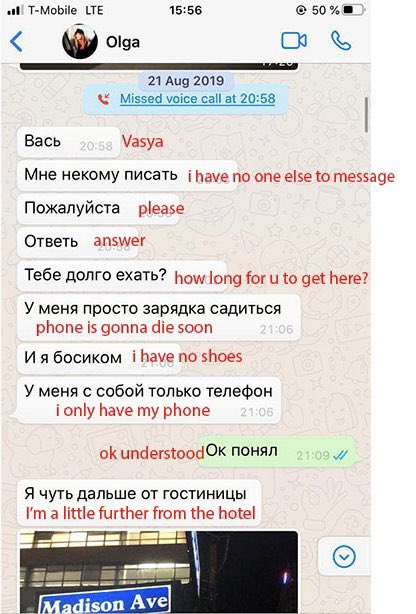
Earlier that day, Wednesday, Aug. 21, 2019, Sharypova had gone sightseeing around New York with two friends, one of whom was her childhood friend Vasil Surduk. Sharypova and Surduk had known each other since their days as children on the courts of Moscow, playing alongside Rublev and his mother.
Surduk, who had played collegiate tennis at Ferris State University in Michigan, was staying in nearby New Jersey. Eager for a rare chance to spend time with a friend of hers to break up the loneliness of her time as a shadow on the tour, Sharypova, Surduk, and another friend of hers spent an afternoon sightseeing in New York City, including a trip to the Statue of Liberty.
Surduk recalls Sharypova being brought to tears during a phone call from Zverev that afternoon, which he believes was his criticizing her venturing out without him.
“He was telling her something on the phone and she started crying,” Surduk said. “We spent two and a half hours, probably. Then I dropped her off by the hotel.”
By the time Surduk made it back across the Hudson River to the home where he was staying in New Jersey, Sharypova was calling and texting him frantically, pleading with him to turn around and pick her up from near the hotel where he had left her.
“I was already pretty much home from Manhattan, and she texted me asking, ‘Can you pick me up? Because I don’t know who I can reach out to besides you,’” Surduk said.
Surduk turned around and drove back to Manhattan, where he picked up Sharypova and brought her to the home in New Jersey. Upon seeing her, his cousin joked that Sharypova must have been in an incredible hurry to leave the city if she didn’t even bring her shoes.
“It was not time for a laugh, but it was a little bit funny,” Sharypova recalled. “She gave me clothes and shoes, and they made me feel like home. It was really, really what I needed. It was a big support for me.”
What she didn’t know at that moment, however, was that the family would soon drive her back to the man she had just escaped.
****
Surduk told me he had already started trying to persuade Sharypova to return to Zverev before they had even reached his house that night.
“Honestly, I don’t like drama and I knew I wanted to help, but I thought they could fix it right away,” Surduk said. “I thought it was nothing serious—but it ended up being very bad. At the same time, when I picked her up that night and I was driving her to the house, I was asking her if she wanted to turn back. She said, ‘No, there’s no way, I can’t do this, I can’t do this.’
“She told me that she was abused, but how badly, or that it had already been happening, I didn’t know that. She said they got in a fight. I knew it was something physical, but how bad it was I didn’t know at this point.”
Surduk said he first received messages from Zverev asking him about Sharypova’s whereabouts later that night, though he waited a couple hours before replying. He admitted that in such conflicts, he was biased toward believing the man.
“I always trust the guys first, at some point, because I’m a guy, you know?” he said. “Even though Olga, I’d known her for so long.”
The next day, Surduk brought Sharypova back to the hotel to collect her things. When she got up to the room, she found many of her possessions dumped out in the corridor of the hotel, disheveled across the hallway’s carpet (the carpet in a photograph Sharypova has shared of her luggage in the hallway matches the carpet of the Lotte New York Palace as seen in the photograph posted on the hotel’s Tripadvisor page).
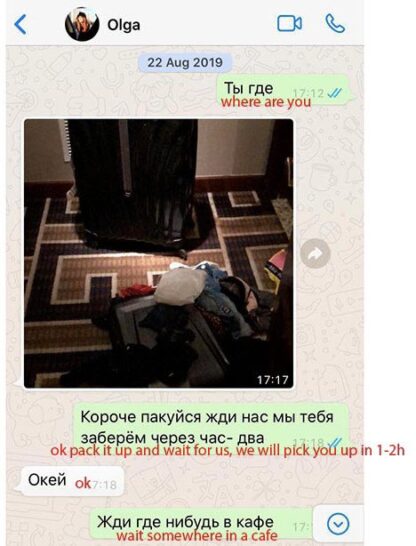
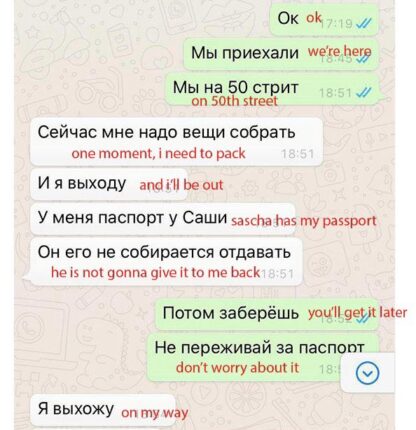
Crucially missing from her belongings was her passport, which stopped her from immediately flying home to Russia as she had hoped. Additionally missing, more surprisingly, were many other possessions: Zverev, Sharypova said, had sorted through her things to remove gifts he had given her “because he wanted to keep his presents.”
“I opened my bag and didn’t see half of my stuff—are you kidding me?” Sharypova said. “Whatever you’ve already done to me is not enough? You want to humiliate me more?”
When I shake my head and say that that must have felt ridiculous, a new voice pipes in from across the living room.
“It’s not ridiculous—it’s terrible,” the woman said.
****
This woman, Surduk’s stepmother and the owner of this house where we have gathered in northern New Jersey, does not want her name mentioned in the story, but she becomes integral to the story from this point; as Vasil’s stepmother, I will refer to her as Mrs. V.
Mrs. V, who joined Sharypova, Surduk, and myself in her living room midway through the interview, told me she had been eager to solve Sharypova’s problems after meeting her last year. In her mind, this meant reuniting her with Zverev.
When Zverev video-called Surduk to check up on Sharypova once more, Mrs. V asserted control of the situation and took the phone to invite Zverev to her home, against Sharypova’s wishes.
“I said, ‘Why don’t you come over here to the house and I’ll sit and talk with you guys, I’m a grown-up person,’” Mrs. V recalled telling Zverev. “And I didn’t believe her; I was absolutely on his side. He goes, ‘She doesn’t want to talk to me.’ I say, ‘She’s within my house limits, and as far as I’m concerned she’ll talk to you.’”
Surduk drove to Queens to pick Zverev up from the USTA Billie Jean King National Tennis Center, where he was training for the next week’s US Open, and took him on the long drive back to New Jersey. Surduk and Zverev had never before met, but they knew many people in common from Russian tennis circles.
When Zverev arrived at the house in New Jersey, Mrs. V said, she was quickly charmed by him.
“He starts with ‘I love her, I want her,’ and I say, ‘When a guy of his rank or whatever says such things, then he really needs you,’” Mrs. V said. “Who would doubt that? He came all the way here.”
Mrs. V said she encouraged Zverev to win Sharypova back by proposing to her.
“He said, ‘I would, but she keeps running away from me,’” she recalled. “I said, ‘Listen, I’m totally on your side.’”
Mrs. V then grimaced.
“Why I’m stepping in here is because I pushed her back. She didn’t want any of that,” she continued. “She wanted just to leave. And Vasil supported me at that time. We both made them make peace and get back together.”
Less than three days after she had fled in terror, Sharypova went back to Zverev.
Delighted to see them reconciling after her efforts, Mrs. V invited Zverev and Sharypova to join her at her birthday dinner at the restaurant Avra Madison in Manhattan. She sent flowers to their hotel room on Sept. 5, 2019, their one-year anniversary; she delighted in receiving romantic photographs from Sharypova showing the two united once more.
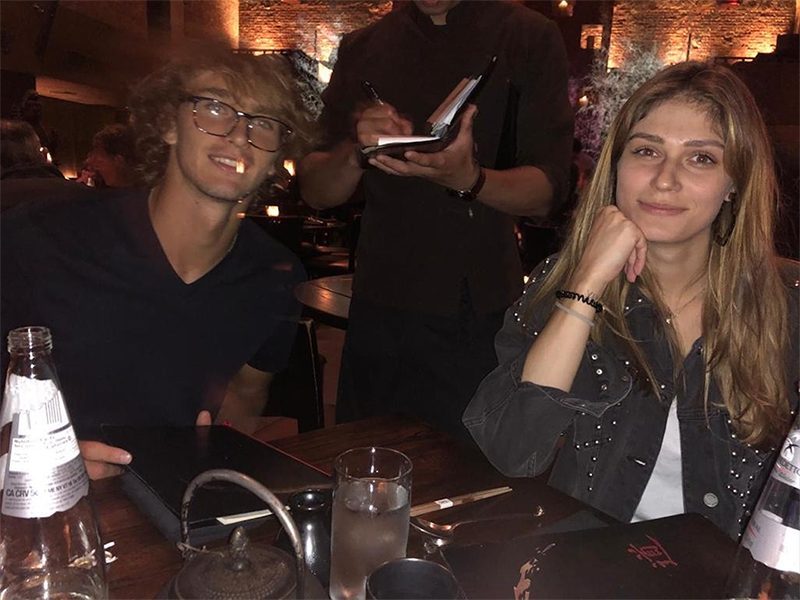
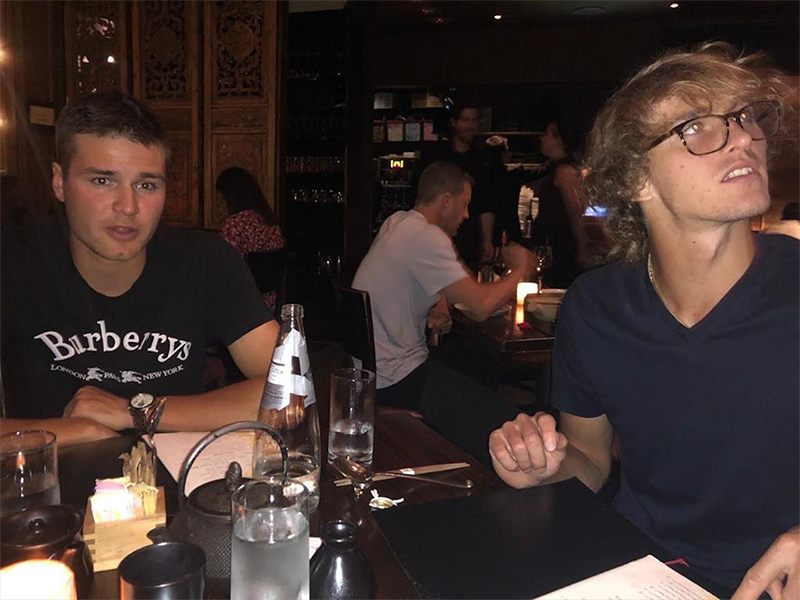
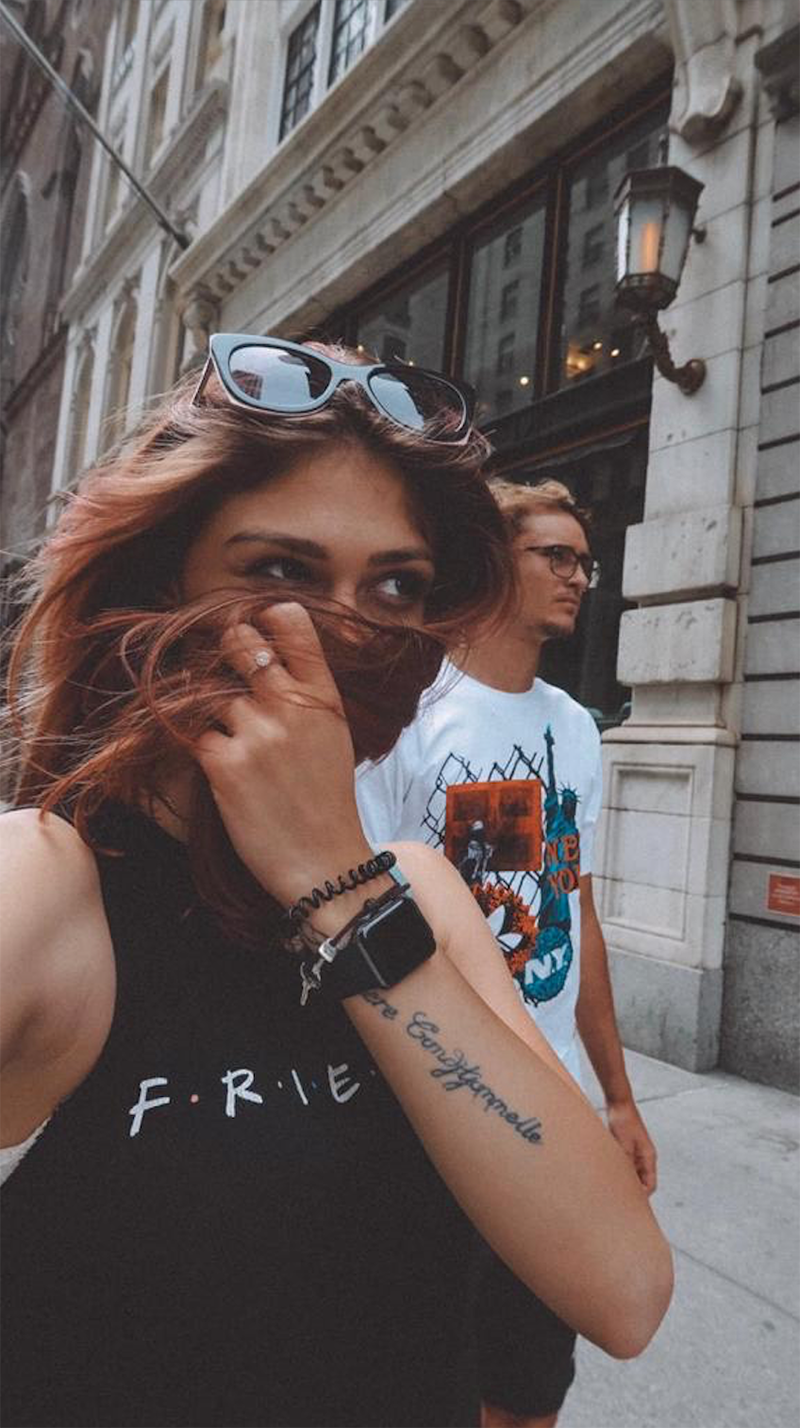
Mrs. V shows me several photographs she has saved, and points through a window out to the porch of her house to where she said Zverev would often retreat because he was allergic to the two cats in the house.
“I’m the reason, I’m the one who pushed her back, because none of us believed her,” Mrs. V said. “She didn’t want any of that. We made her go back, me and him. We believed him, because he was so convincing when he would tell his story that he doesn’t want anybody else in this world.”
Here, Sharypova interjects for the first time in several minutes.
“He was a really good liar.”
Mrs. V, in turn, is considerably more blunt.
“I feel so fucking guilty that I didn’t believe her.”
After finding the resolve to break free, Sharypova found herself boggled by self-doubt after being so enthusiastically persuaded to go back to Zverev.
“At that time I thought I was really crazy,” Sharypova said. “I thought I was really out of my mind.”
Sharypova continued onward with Zverev on the tour, again alone with him. Once she reunited with Zverev in New York, she said, her passport suddenly turned up.
“I really forgave him because people here were convincing me,” she said. “I thought, ‘Okay, maybe I’m really out of my mind and I really don’t understand what I’m doing and what I should be doing.’ We went to Geneva.”
****
Zverev was in Geneva to play in the Laver Cup, an event created by his management company Team 8, which Zverev would go on to clinch for Team Europe with a decisive victory in the final match. Sharypova, meanwhile, felt more lost than ever before.
“I was in a deep depression,” she said. “I already don’t want to live. I already don’t understand what I’m living for. Whatever happened in Geneva, it was worse than anything that came before. Anything else before that was like flowers.”
More than the reunification, Sharypova believes things had changed between them during their physical altercation in New York.
“In this moment he understood that he’s much stronger in this way than me, physically stronger,” Sharypova said. “He starts doing this much more. When he realized that he had nothing to say, he started to do this.”
Sharypova said her next fight with Zverev, in their hotel room in Geneva, was the worst yet.
“We had another fight, and in that fight he punched me in the face for the first time,” she said. “In other fights he was pushing me, shoving me, twisting my arms, choking me. But this was the first time he punched me, really punched me. When he left the room, I…”
Sharypova stopped and began to cry. When I offered to her that we can take as long of a break as she would need, she quickly accepted. About a minute later, she returned to the living room.
“It’s really hard to talk about this, because it really was a hell,” she said. “I’m going to start talking about this, and I want to finish. I want to say this and then forget about this. After this fight he left the room, and I was dying. I was emotionally dying. I didn’t understand everything in my life. I couldn’t understand why I was dealing with this, and why he’s not leaving me, why this keeps happening. I understand that I can’t live like this anymore. I understand that I can’t be with this person anymore, but he can’t leave me. I knew he wouldn’t let me go.”
Sharypova found her solution in the hotel room: a supply of insulin in Zverev’s room.
“I take the insulin. I knew that if you’re a healthy person and you take insulin, you can die.”
Sharypova said she injected the insulin into herself.
“I injected it, and I wasn’t scared; I just wanted to leave in some way, because I can’t stand it anymore,” she said. “He came back in the room—I was in the bathroom with the closed door. I was just waiting for it to happen. He understood what I did and he started begging me to open the door.”
Sharypova said Zverev found an official from the event who came and talked to her through the door, ultimately persuading her to let them in. (The official whom Sharypova named declined to speak when contacted for this article, citing their professional obligation to keep incidents involving players private.)
“[They were] saying, ‘Please, Olga, open the door, we need to help you,’” Sharypova said. “I was just crying, and I didn’t understand what to do. I opened the door.”
Sharypova was given what she believes were glucose tablets to counteract the insulin. She recovered, but said she spent three days in the hotel room with the curtains closed, lying in bed, thinking about how she had been prepared to die.
“I was ready for that; I wanted to,” Sharypova said. “I didn’t want to live anymore. I had always heard these things from him, that I’m a bad person, I don’t deserve anything. I thought, ‘If I’m a bad person and no one cares about me, for what am I living?’ Me, a person who always was happy. I’m really a normal person, and all of my friends know me to be positive, and I’m in this situation.”
Sharypova said her loved ones were stunned when she told them what she had done.
“When I said about this to my best friend, actually the first time she didn’t believe me,” Sharypova said. “She said, ‘You are not this type of person; you’re strong, you’re beautiful, you’re happy, you have your whole life. Why did you do this? Some guy? You can leave him!’ I said, ‘I can’t, because he won’t leave me alone.’
“For my parents it was really hard,” Sharypova added. “I texted them that I’m sorry, that I didn’t deserve this life and I’m going to leave. They were really scared for me. I’m really sorry for this, because they went through a lot at this point. They couldn’t help, and they weren’t there. They couldn’t come to me. It was a really hard time for my family and me as well.”
Sharypova is considerably happier now, she said, especially as she has found her voice this week.
“Thank God I’m alive, and thank God I’m happy now, and thank God it’s done,” she said. “And now I’m far away from it.
Good on Olya for opening up. It would have been pretty scary! I just hope that she can handle all the negativity and what’s to come next. #ibelieveOlya #WhyIStayed except #whySheStayed #stopviolenceagainstwomen
— Daria Gavrilova (@Daria_gav) October 29, 2020
There is considerably more to Sharypova’s story—including her final escape from Zverev in China with the help of Mrs. V—and she said there will be more time to tell it, but by this point in our conversation Sharypova was understandably exhausted.
“That’s my story for today,” she said. “I just want to say that they were ignoring me back then, but now I’m not going to be ignored. I’m not nothing. I’m a person, and I have a voice and I can’t be silent anymore. It was really hard to start talking about this, but I know that many people are going through maybe not the same situation, but many people are facing the same things with harassment, abuse, bullying, toxic relationships, and they don’t understand what to do. I want to show everybody at the end of the day there can be a good end to the story. Because I didn’t want to live last year, and now I’m sitting with you.
“Many people are scared to do what they want,” Sharypova adds. “They want to scream, but they’re silent. They want to run, but they just sit. I just want people to understand that life is really short, and you must enjoy it. That’s all.”
Above: Olga Sharypova at the 2019 Beijing China Open, after what she says had been a month of the worst abuse from her ex-boyfriend Alexander Zverev. (Getty Images)
Last image: WTA player Daria Gavrilova offered words of support on social medial



